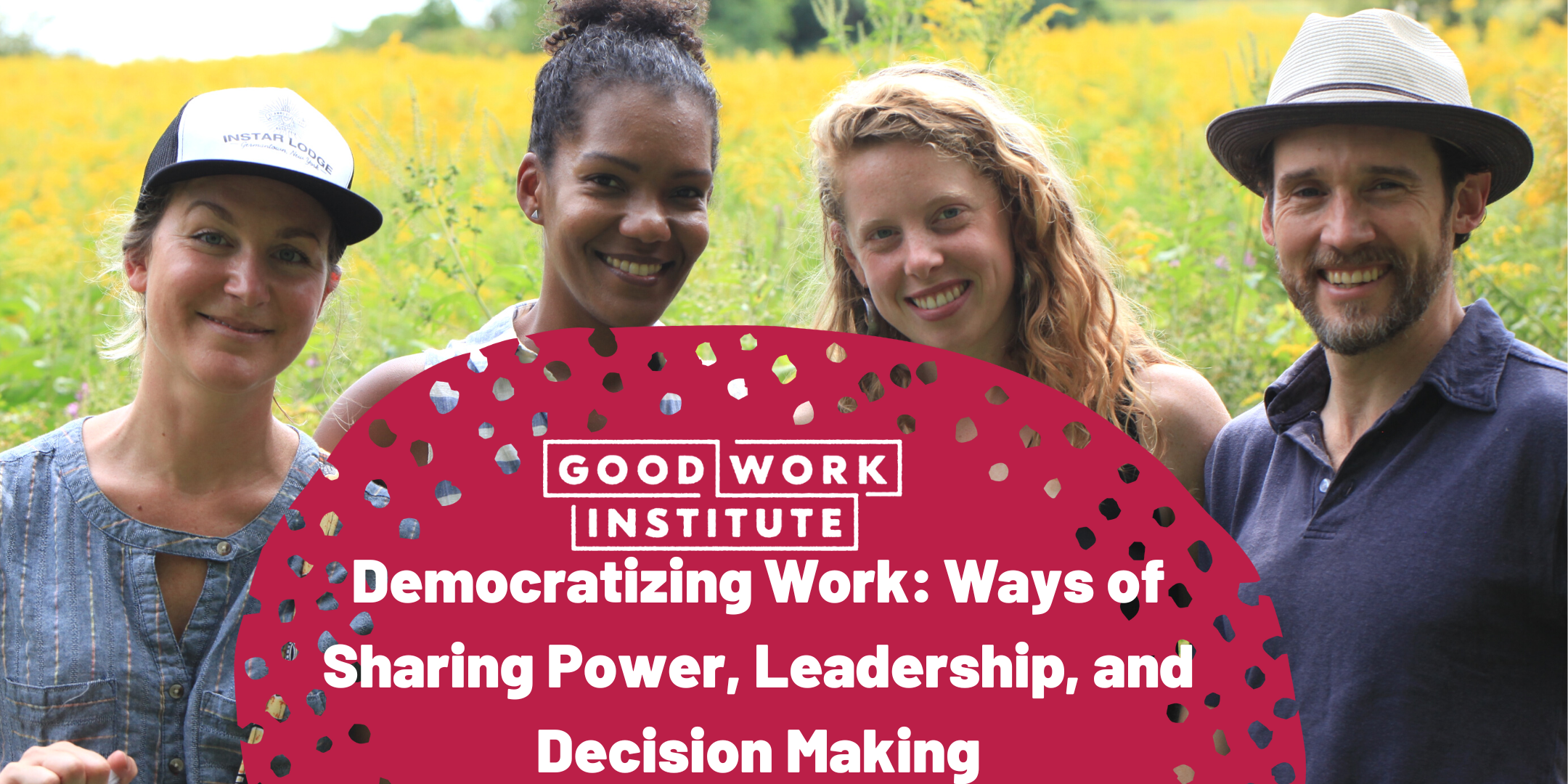
- Date
- Time
- Location
- Schedule
We request that participants attend all three workshops.
Session 1 - March 8th 9:30-12: Frameworks and Models of Shared Leadership
Session 2 - March 10th 9:30-12: GWI Case Study: Policies, Practices and Culture of a Worker Self-Directed Nonprofit
Session 3 - March 14th 9:30-12: Tools that Support Democratic Ways of Working and Making Decisions Together
- Fee
Join the Good Work Institute and Co-op Hudson Valley as we explore the tools, policies, practices, culture, frameworks, and models of shared leadership and democratic decision making.
About this event
In this three-part series, we will get into the nuts and bolts of tools, policies and practices that support democratic decision making, and discuss broader relational shifts that facilitate a culture of shared leadership. We will explore the broader context of shared leadership, including motivations, frameworks and models applicable to different types of organizations, both businesses and nonprofits.
In 2019, the Good Work Institute team made the collective decision to move from a hierarchical organization to a Worker Self-Directed Nonprofit. Together, we built a system of shared governance and leadership that serves the needs of our organization while honoring our unique talents as individuals. Using GWI’s transition and system as a case study, we’ll explore how we can bring democratic values into the way we work and build deeper connections to our impact, purpose, and each other.
Rather than provide a specific template approach, this series is designed to support participating organizations to see opportunities to evolve their own structure and processes. Together, we will explore:
- Frameworks and Models of Shared Leadership
- GWI Case Study: Policies, Practices and Culture of a Worker Self-Directed Nonprofit
- Tools that Support Democratic Ways of Working and Making Decisions Together
We request that participating organizations send a minimum of two workers, and that participants attend all three workshops. Shared leadership is a collaborative practice, and we believe that the more workers present, the easier it will be for an organization to engage with this work. Our recommended best practice is to send a delegation of workers that represent different professional backgrounds and different levels of authority within the organization.
Angela DeFelice (she/her) grew up in a rural, working class community in Western NY, and for the last 13 years has lived in and around Poughkeepsie (Mohican-Munsee Lenape land). Her journey into the cooperative ecosystem began as co-founder and worker owner of Rock Steady Farm, a queer owned cooperative enterprise. Angela is excited by the power-building potential of community and worker ownership, and brings this energy to her current work as Project Officer with Co-op Hudson Valley.
Micah (he/him) is of mixed race (black and white) and mixed religion, and grew up in two different socio-economic homes. He is a cisgendered, working/middle class parent of two living on Munsee/Lenape land in the Mahicantuck Valley, commonly referred today as Kingston, NY. As a Worker Trustee of the Good Work Institute and a member of the Community Fund, Democratizing Work, Fiscal Sponsorship and Greenhouse Circles, he is working to prove possibility and to liberate the imagination in order to see a Just Transition.
Susan (she/her) is a white, working/middle class, cisgendered parent. As a Worker Trustee and Learning Steward of the Good Work Institute and a member of the Community Engagement and Democratizing Work Circles, she is energized by opportunities to learn and facilitate learning; to design participatory gatherings and organize information; to tap into the power of effective collaboration and the generative potential of conflict; to connect across differences and contribute toward more equitable futures in her communities based in Poughkeepsie, NY and the wider Mahicantuck Valley.
Other GWI Worker Trustees may also be present to facilitate portions of this workshop series.
Process: Ticket prices (see "Fee" below) are per organization, and you are able to register up to five workers for each ticket. We request that each participating organization register at least two workers, and that participating workers come from diverse professional backgrounds and levels of authority within the organization. This is a multi-session workshop and we expect all participants to attend all three sessions. Once you provide basic registration information for your organization’s workers, they will each receive a form to complete their registration details.
Fee: The fee for this workshop is on a sliding scale, determined by the annual budget of your organization. Each ticket covers all three sessions and includes registration for up to five workers at rates as low as $30-$120 per person depending on organization budget size and number of workers participating. We request that at least two workers from your organization participate, and recommend registering as many workers as are available to participate.
- $150 For up to 5 people if your organization’s annual budget is less than $250,000
- $300 For up to 5 people if your organization’s annual budget is $250,000 to $500,000
- $450 For up to 5 people if your organization’s annual budget is $500,000 to $750,000
- $600 For up to 5 people if your organization’s annual budget is greater than $750,000

